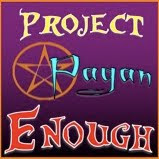In my tradition of Feminist Witchcraft, Samhain is the Third Harvest, the Witches' New Year, and the Feast of the Beloved Dead. This is the time when we honor those who have gone before, our literal ancestors and our spiritual ancestors, those whose names we know and those whose names are lost to us. We mourn endings and losses of the past year. And we welcome babies who were born this year and honor new beginnings from this last year.
It can be a very tender time of year for many of us. A time to gather together, grieve, and rejoice.
For our potluck, my particular little group often sets our theme as "Remembrance Food: Food that honors your ancestors or cultures that have nurtured you."
The time between Samhain and Winter Solstice is the time between death and rebirth. At Winter Solstice, the Sun is reborn -- on the shortest day, the Sun comes back to us; "life comes new from Death" [Schrag, "Kore, Evohe"].
In our culture, we're used to thinking of birth as the beginning of life, and death as the end. But really, death and life are a circle, and we can't actually say what comes first: death paves the way for new life. Without the death of the old year, the new year can't be born; without the death of the old leaves, new leaves can't be born; without time in the Darkness, seeds, ideas, and babies can't germinate; without the sacrifice of our food -- the grain and the animals, Lugh and the Horned One -- we wouldn't eat; all light casts a shadow.
Every seed becomes a promise
Kore takes them in Her hands
Into the Earth, and into the Darkness
And into the quiet lands...
- John Schrag, "Kore, Evohe"
With every change comes some kind of end: without the "death" of an old way of being, the new way wouldn't be "born." Loss is inherent in change.
Witches have a saying: All things must change, or die; and death is change.
This Samhain, I am remembering my grandparents, their parents, and others who have died over the years and who will always be with me -- friends, loved ones, family members, former partners, teachers, mentors, spouses of friends, beloved pets...
I'm also honoring people who have died this year, or whose deaths I've just learned of this year, several of whom I've mentioned on this blog under the tag "Samhain." Christine Oliger, Father Emery Tang, George Willoughby, Morton Kravitz, Mabel Lang, Art Gish, Carolyn Diem, Sarah Leuze, Lynn Waddington, Gene Stotlzfus, Betty Nebel, and others. And people I didn't know personally, but still honor, like Miep Gies, Dr. William Harrison, Daniel Schorr, and others.
This Samhain, who are you honoring?
- Who are your ancestors, literal, spiritual, metaphorical? Known and unknown?
- Who are your beloved dead you honor?
- Who are your not-so-beloved dead you are glad to release?
- Who are you mourning?
- What new beginnings do you honor from this last year?
- What new babies did you welcome this last year?
Who is remembered, lives.
Blessed be.







